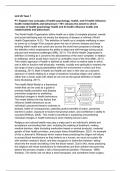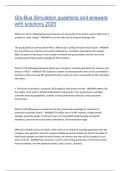P1- Explain how concepts of health psychology, health, and ill health influence
health related beliefs and behaviours + M1- Assess the extent to which
concepts of health psychology health and ill health influence health and
related beliefs and behaviours
The World Health Organisation define health as a state of complete physical, mental,
and social well-being and not merely the absence of disease or infirmity (World
Health Organization, N.D.). This definition of health as a complete wellbeing is seen
by some as no longer fit for purpose given the rise of chronic disease and those
working within health and social care across the world have proposed a change to
the definition which emphasises the ability to adapt and self-manage during social,
physical and emotional challenges (BMJ, 2011). The World Health Organization’s
definition is limiting as it concerns the absoluteness of the word ‘complete’ in relation
to wellbeing, which would leave most of us unhealthy most of the time (BMJ, 2011).
The holistic approach of health is defined as health which is relative state in which
one is able to function well physically, mentally, socially and spiritually to express the
full range of one’s unique potentialities within the environment in which one lives
(Svalastog, 2017). Both ill health and health are seen in this view as a dynamic
spectrum of needs relating to a range of situations including religion and culture,
rather than a linear scale with death at one end as the typical definition of health
does (Svalastog, 2017).
The Health Belief Model is a theoretical
model that can be used as a guide to
promote health promotion and disease
prevention programs by predicting
individual changes in health behaviours.
The model defines the key factors that
influence health behaviours as an
individual’s perceived threat to sickness or
disease, belief of consequences, potential positive benefits of action, perceived
barriers to action, exposure to factors that prompt action, and confidence in ability to
succeed (RHIhub, 2005). This model is beneficial in explaining and predicting
individual changes in health behaviours when treating service users.
Religious and cultural beliefs may play a major part in an individual’s beliefs and
acceptance surrounding their care, including the seeking of treatment, making
medical decision, diets (including medication based on animal products), modesty/
gender of their health providers, and prayer times (HealthStream, 2021). An example
of this is Jehovah’s Witnesses which means those practicing the religion will refuse
to accept blood transfusions as they believe as a human, we must not sustain life
with another creature’s blood, and they recognize no distinction between ‘taking
blood into the mouth and taking it into the blood vessel’. Due to this, those practicing
the religious will refuse transfusions for themselves and their children because they
believe the process creates a risk of losing eternal salvation (Thompson, 1989).
Similarly, The Amish will not allow a heart transplant, and sometimes heart surgery,
, as the heart is viewed as ‘the soul of the body’ and rely on folk/herbal remedies and
other more natural antidotes to improve their health, as they believe that God is the
ultimate healer. They also do not practice birth control, often lacking prenatal care
and avoiding preventative screenings (HealthStream, 2021). These examples
demonstrate how successful healthcare outcomes can only be met once there is a
large understanding of spiritual belief, and religious freedom must be considered.
Consequentialism is a theory that says whether something is good or bad depending
on its outcomes, and individuals must then assign a value to the possible outcomes
of each action, and a probability for each these outcomes occurring when making a
decision (The Ethics Centre, 2016). An example of this is how most people
collectively agree that lying in wrong, but consequentialism suggests that if telling a
lie would save a person’s life, it is the correct thing to do. In circumstances where
patients ‘’choose faith over medicine’’, professionals aim to remain open-minded and
flexible, however is there is a strong belief that the patient’s religious views will cause
them to suffer harm, an additional effort may be made to persuade the individual to
follow medical recommendations (Curlin, 2005). In situations when parents are
making poor medical decisions for their children due to their religious views, an
ethical dilemma is created, and this then is passed onto the hospital ethics
committee. An example of this is how in Johnathon Robinson’s care he is
refusing pain killers due to fear of becoming addicted to them, however this
skewed view of his treatment is ultimately worsening his condition, as his pain
in not being effectively controlled, he is therefore becoming inactive, gaining
weight and having financial issues due to being unable to work. His assigned
values to these pain medications due to his thought of negative possible
outcomes is becoming a barrier to him receiving the care and treatment he
needs to improve his health.
Talcott Parson’s theorised The Sick Role in the 1950s which suggested that
illness is a form of deviance as health is necessary for a functional society.
Parsons described four postulates, or obligations, associated with the Sick
Role which are the following: The person is not responsible for assuming the
sick role, the rick person is exempt from carrying out some or all of normal
social duties, the sick person must try and get role (the sick role is only a
temporary phase), and in order to get well, the sick person needs to seek and
submit to appropriate medical care (Mitchell, 2013). Parson’s then devised the
‘sick role mechanism’ which portrayed how doctors and patients should
function to prevent what Parson’s called the ‘subculture of the sick’ from
developing (Milton, N.D.). Despite this theory, many argued that this idea of the
perfect doctor-patient relationship was too binary, making it unrealistic and
misguided (Milton, N.D.). This concept that for an individual to be defined as
sick and therefore be removed from social responsibilities such as taking time
off of work, they must first seek medical advice and treatment. For Jonathan
Robinson, this means complying with medical treatment, such as taking
prescribed medications from his doctor to improve his health and seek out
resolutions to his presented issues to prevent his health from worsening.
Once he has complied with these ‘postulates’ of Parson’s sick role he can be



